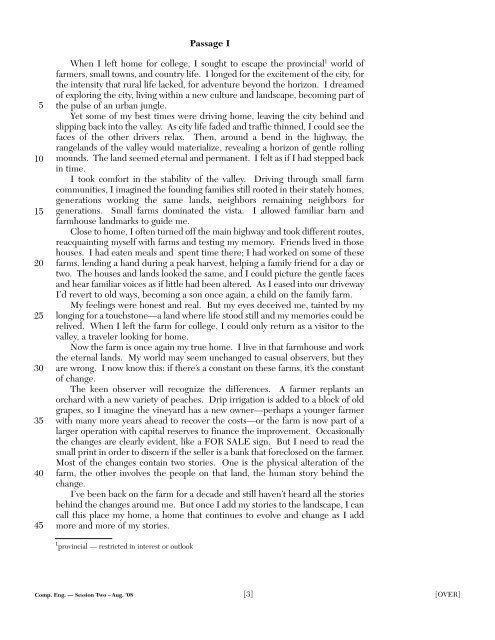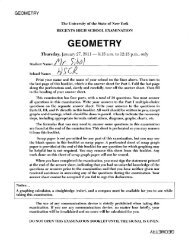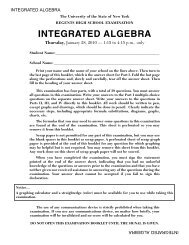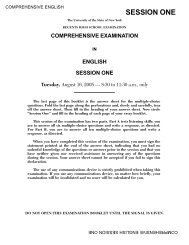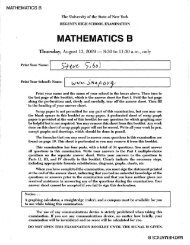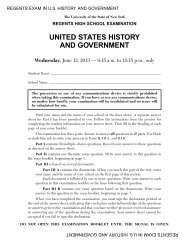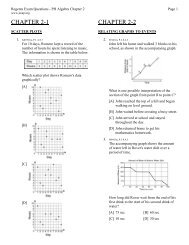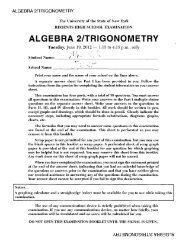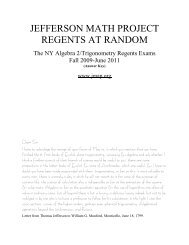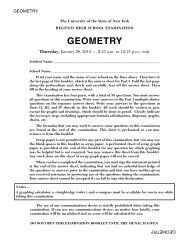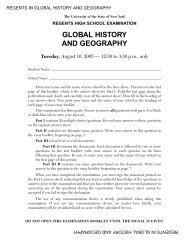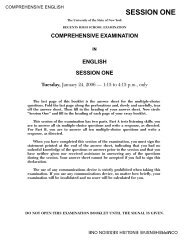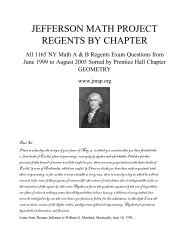SESSION ONE - JMap
SESSION ONE - JMap
SESSION ONE - JMap
You also want an ePaper? Increase the reach of your titles
YUMPU automatically turns print PDFs into web optimized ePapers that Google loves.
Passage I<br />
5<br />
10<br />
15<br />
20<br />
25<br />
30<br />
35<br />
40<br />
45<br />
When I left home for college, I sought to escape the provincial 1 world of<br />
farmers, small towns, and country life. I longed for the excitement of the city, for<br />
the intensity that rural life lacked, for adventure beyond the horizon. I dreamed<br />
of exploring the city, living within a new culture and landscape, becoming part of<br />
the pulse of an urban jungle.<br />
Yet some of my best times were driving home, leaving the city behind and<br />
slipping back into the valley. As city life faded and traffic thinned, I could see the<br />
faces of the other drivers relax. Then, around a bend in the highway, the<br />
rangelands of the valley would materialize, revealing a horizon of gentle rolling<br />
mounds. The land seemed eternal and permanent. I felt as if I had stepped back<br />
in time.<br />
I took comfort in the stability of the valley. Driving through small farm<br />
communities, I imagined the founding families still rooted in their stately homes,<br />
generations working the same lands, neighbors remaining neighbors for<br />
generations. Small farms dominated the vista. I allowed familiar barn and<br />
farmhouse landmarks to guide me.<br />
Close to home, I often turned off the main highway and took different routes,<br />
reacquainting myself with farms and testing my memory. Friends lived in those<br />
houses. I had eaten meals and spent time there; I had worked on some of these<br />
farms, lending a hand during a peak harvest, helping a family friend for a day or<br />
two. The houses and lands looked the same, and I could picture the gentle faces<br />
and hear familiar voices as if little had been altered. As I eased into our driveway<br />
I’d revert to old ways, becoming a son once again, a child on the family farm.<br />
My feelings were honest and real. But my eyes deceived me, tainted by my<br />
longing for a touchstone—a land where life stood still and my memories could be<br />
relived. When I left the farm for college, I could only return as a visitor to the<br />
valley, a traveler looking for home.<br />
Now the farm is once again my true home. I live in that farmhouse and work<br />
the eternal lands. My world may seem unchanged to casual observers, but they<br />
are wrong. I now know this: if there’s a constant on these farms, it’s the constant<br />
of change.<br />
The keen observer will recognize the differences. A farmer replants an<br />
orchard with a new variety of peaches. Drip irrigation is added to a block of old<br />
grapes, so I imagine the vineyard has a new owner—perhaps a younger farmer<br />
with many more years ahead to recover the costs—or the farm is now part of a<br />
larger operation with capital reserves to finance the improvement. Occasionally<br />
the changes are clearly evident, like a FOR SALE sign. But I need to read the<br />
small print in order to discern if the seller is a bank that foreclosed on the farmer.<br />
Most of the changes contain two stories. One is the physical alteration of the<br />
farm, the other involves the people on that land, the human story behind the<br />
change.<br />
I’ve been back on the farm for a decade and still haven’t heard all the stories<br />
behind the changes around me. But once I add my stories to the landscape, I can<br />
call this place my home, a home that continues to evolve and change as I add<br />
more and more of my stories.<br />
1 provincial — restricted in interest or outlook<br />
Comp. Eng. — Session Two – Aug. ’08 [3] [OVER]


